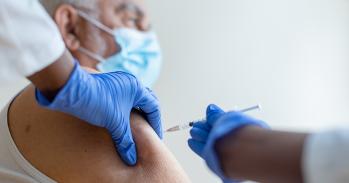
Long hours running COVID-19 vaccine and drugs trials have left little time for Estée Török to contemplate her postponed wedding. With over 20 years' clinical research experience in infectious diseases in the UK and south-east Asia, she has a great deal to contribute to tackling the pandemic.
Long hours running COVID-19 vaccine and drugs trials have left little time for Estée Török to contemplate her postponed wedding. With over 20 years' clinical research experience in infectious diseases in the UK and south-east Asia, she has a great deal to contribute to tackling the pandemic.
This article is part of a series in which we speak to some of the many Cambridge researchers tackling COVID-19. For other articles about our latest COVID-19-related research, click here.
I’m a clinical academic working in the Department of Medicine at the University of Cambridge and at Cambridge University Hospitals NHS Foundation Trust. With most of my research team I have continued to work at Addenbrooke’s during lockdown, but we’ve all worked much longer hours than usual. In fact, until recently I hadn’t had a day off for six weeks.
My clinical experience and research interests are in infectious diseases, microbiology and genomics. I have been involved in clinical trials of infectious diseases - including TB, HIV, viral hepatitis, Staphylococcus aureus and multidrug-resistant bacteria - in the UK and in Southeast Asia for nearly 20 years. Since moving to Cambridge my research has focussed on using genome sequencing to investigate transmission of pathogens in hospital and community settings. These skills have prepared me to respond to the COVID-19 pandemic response efforts in Cambridge.
As a clinician I’m interested in understanding the epidemiology of infectious diseases and how best to treat them. I have used my clinical trials experience to contribute to the RECOVERY trial, a randomised controlled trial of various treatments for COVID-19, as a study doctor. To date this is the world’s biggest trial of drugs to treat COVID-19 patients, and the results are regularly reviewed so that any effective treatment can be quickly made available to patients. A preliminary analysis has found that dexamethasone (a steroid drug), a cheap and readily available treatment, reduces mortality in patients with COVID-19 requiring respiratory support.
I also set up and led a novel coronavirus vaccine trial, the ‘COV002’ trial, in Cambridge. This is a phase 2/3 trial of the vaccine developed by the University of Oxford, which is being tested in over 10,000 healthy volunteers in 19 UK centres. We rapidly assembled a team of over 70 research staff in three NHS Trusts (Cambridge University Hospitals, Royal Papworth Hospital and Cambridgeshire and Peterborough NHS Foundation Trust) in Cambridgeshire. We screened over 500 healthcare workers and vaccinated over 300 of them in just over three weeks. The results of this trial will also give us vital information on the safety and efficacy of this vaccine, production of which is already being scaled up by AstraZeneca.
I used rapid sequencing of SARS-CoV-2 virus to investigate patients with COVID-19 infections at Addenbrooke’s Hospital. This work was done in collaboration with the Department of Pathology and the Public Health England Clinical Microbiology and Public Health Laboratory, as part of the COVID-19 Genomics Consortium UK. We set up and implemented a system to rapidly sequence clinical samples and to investigate healthcare-associated COVID-19 infections by analysing epidemiological and genomic data. This information was fed back to the hospital infection control and hospital management teams to investigate suspected outbreaks and improve infection control. The data we gather will help to guide UK public health interventions and policies.
The biggest challenges we face relating to this pandemic are to prevent people from becoming infected with SARS-CoV-2, and to find treatments that can prevent the development of severe COVID-19 disease and save lives. Developing an effective vaccine really is key to controlling the pandemic.
COVID-19 is a global public health emergency that requires national and international collaborative efforts. I feel very fortunate to have been able work with outstanding clinical and academic colleagues in three NHS Trusts in Cambridgeshire, different clinical and University departments, and other UK institutions to contribute to these efforts.
With a dedicated and enthusiastic team it’s possible to achieve extraordinary things in a short period of time. It is important to recognise what is clinically and scientifically important, and to focus all your efforts on this.
I was due to get married in June. When the pandemic is over, I’m looking forward to seeing my friends and family, getting back to triathlon training, and getting married!
Estée Török is Clinician Scientist Fellow and a Senior Research Associate in the Department of Medicine at the University of Cambridge, and an Honorary Consultant in Infectious Diseases and Microbiology at Addenbrooke’s Hospital.
How you can support Cambridge’s COVID-19 research

The text in this work is licensed under a Creative Commons Attribution 4.0 International License. Images, including our videos, are Copyright ©University of Cambridge and licensors/contributors as identified. All rights reserved. We make our image and video content available in a number of ways – as here, on our main website under its Terms and conditions, and on a range of channels including social media that permit your use and sharing of our content under their respective Terms.




